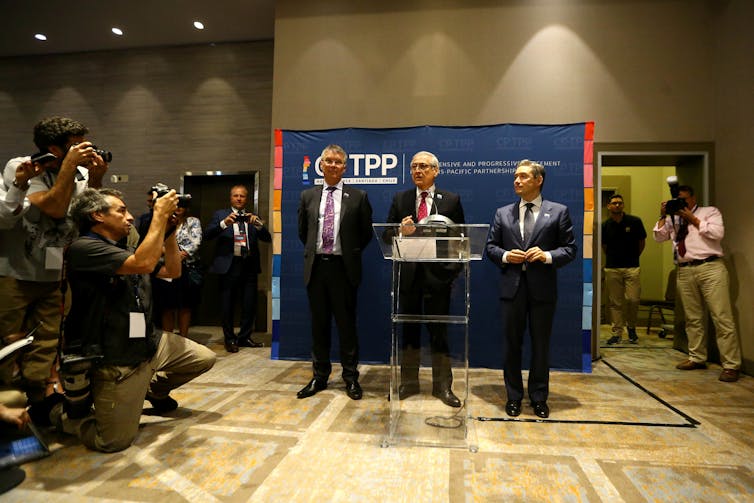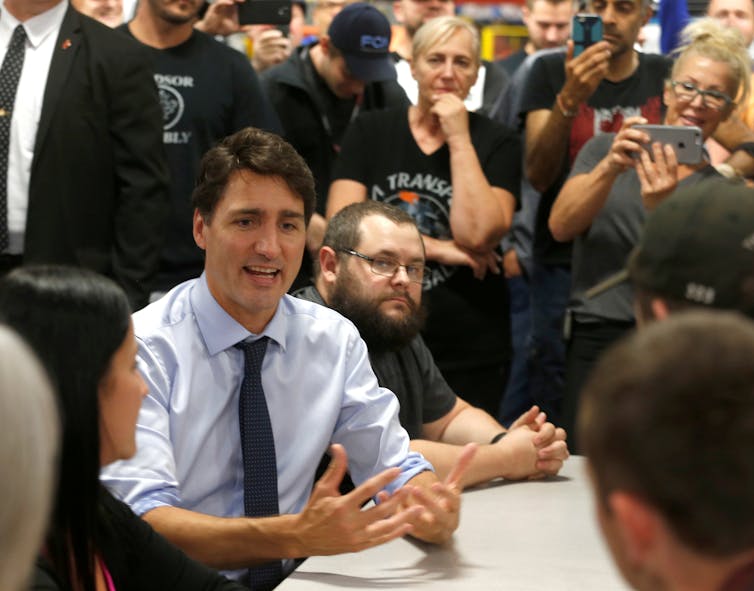Free trade isn't dead yet – despite Trump's threats to the system that upholds it
- Written by Jeffrey Kucik, Assistant Professor of Political Science, University of Arizona
The rules-based world order, which has been the scaffolding supporting the global economy since World War II, appears to be in serious jeopardy. And, judging by the number[1] of eulogies[2] published[3] in recent months[4], it would be easy to conclude that this system[5] of international cooperation on trade and other issues is already dead.
Concern for the fate of cooperation among nations is understandable. In his attacks on the United Nations[6], NATO[7] and the World Trade Organization[8], President Donald Trump has shown his disdain for American commitments to peace, security and trade.
Notwithstanding Trump’s bluster, I believe it’s too soon to mourn the end of international cooperation. While there are some very real challenges facing the global system, when we look at international economic law – one of my areas of expertise[9] – there are several reasons to believe that it can, and will, endure.
Trade cooperation under threat
Trump has been attacking free trade since his 2016 campaign.
He singled out multilateral trade agreements such as the Trans-Pacific Partnership[10] as harmful to U.S. interests. He also claimed the North American Free Trade Agreement was responsible for accelerating the decline[11] in American manufacturing.
Once in office, this anti-trade rhetoric turned into policy. Trump withdrew[12] from the TPP, demanded[13] a renegotiation of NAFTA and has repeatedly threatened[14] to leave the WTO. And earlier this year, he began trade wars[15] with allies such as the European Union and rivals like China.
In addition to concerns[16] that these actions will harm Americans’ pocketbooks, there is fear that Trump’s strategy is eroding faith in the very rules that promote economic cooperation, including those intended to limit trade protection and constrain retaliation.
Look beyond Trump’s tough talk on trade, however, and you’ll see reasons to be hopeful.
 The Trans-Pacific Partnership trade deal lives on despite U.S. withdrawal.
Reuters/Ivan Alvarado[17]
The Trans-Pacific Partnership trade deal lives on despite U.S. withdrawal.
Reuters/Ivan Alvarado[17]
The WTO is still active
Many cite the president’s attacks[18] on the World Trade Organization as evidence that the system is breaking down[19].
Trump’s main problem with WTO is its formal system for dispute settlement, which the White House argues[20] treats the U.S. unfairly. Indeed, the United States is sued more often[21] than any other country.
In response, Trump has threatened to ignore[22] WTO rulings and U.S. authorities have blocked[23] the appointment of new appellate judges to the organization.
These moves are certainly disconcerting given that U.S. withdrawal would be a serious blow to a system it once helped build. However, ongoing activity in the WTO’s dispute system indicates that other members still see value in the system.
Instead of relying solely on unilateral trade retaliation, countries have filed 17 new filings[24] against the U.S. this year to combat its tariffs and other protectionist measures. That is the highest number of cases against the U.S. since steel tariffs brought on a wave of disputes[25] in 2002.
But rather than supporting Trump’s contention that the WTO is biased against the U.S., these filings are a statement that economies around the world want the system to work. And for good reason. There are benefits to seeking settlements at the WTO over punitive tariffs.
For example, research shows[26] that WTO dispute settlement works pretty well as a way to combat discriminatory trade policies. Countries comply with the WTO’s rulings about 60 percent of the time. While that may not seem like a lot, given the WTO isn’t strictly able to enforce its rulings[27], 60 percent compliance is actually pretty good.
By bringing these complaints to the WTO, countries also draw the world’s attention[28] to violations, naming and shaming violators of the rules, effectively damaging the reputations of leaders who erect discriminatory barriers.
And just as importantly, in some circumstances[29], disputes may even deter[30] future violations.
Governments clearly recognize these benefits.
No shortage of new agreements
Another reason trade experts and economists bemoan[31] the end of cooperation is that Trump is snubbing multilateral agreements in favor of bilateral ones[32], which, he says[33], can better leverage U.S. market power[34] to secure better deals.
While it’s true that there has been a spate of new one-on-one agreements among U.S. trading partners in the last few years, this isn’t evidence that other countries are buying into Trump’s rhetoric.
Notably, the TPP didn’t die with Trump’s withdrawal. Partly on the insistence of Japan[35], the rebranded Comprehensive and Progressive Agreement for Trans-Pacific Partnership was signed[36] in March.
This new deal looks like a sign of things to come. Canada currently has a conversation ongoing[37] with Japan. South of the border, Mexico has been talking[38] to China.
Bilateral deals may be seen as messy[39] and even inefficient[40] compared with the multilateral trading system. But that reading is too simple.
It’s important to recognize that the WTO hasn’t undergone comprehensive revisions in many years, and this has led countries to prefer regional and bilateral alternatives.
But these alternatives don’t necessarily signal a turn away from cooperation. Nor are they representative of a global wave of Trump-inspired economic nationalism. Just the opposite. In an effort to maintain open trade routes, countries are seeking alternatives to U.S. leadership.
 Trump’s NAFTA ‘victory’ may have done lasting damage to relations with Canadian Prime Minister Justin Trudeau.
Reuters/Rebecca Cook[41]
Trump’s NAFTA ‘victory’ may have done lasting damage to relations with Canadian Prime Minister Justin Trudeau.
Reuters/Rebecca Cook[41]
Don’t mourn yet
Certainly, it is difficult to overstate the damage that Trump’s strategy is doing to American diplomatic relations.
By many[42] accounts[43], his main “victory” on trade – the conclusion of negotiations over a new NAFTA – came at the expense[44] of any lingering goodwill between Trump and Canadian Prime Minister Justin Trudeau.
And that victory, has been seen[45] as much ado about nothing,[46] resulting in very modest revisions[47] to the status quo.
Yet one significant result[48] of Trump’s tirades against trade law is a growing push[49] for much-needed reform at the WTO, particularly by Canada and the EU. If successful, this could result in actually boosting international economic cooperation.
Whether those efforts will be successful is uncertain. But at the very least, countries seem interested in salvaging the system. As long as that’s true, it’s too soon to mourn the end of trade cooperation.
References
- ^ number (newrepublic.com)
- ^ eulogies (www.politico.com)
- ^ published (www.politico.eu)
- ^ recent months (washingtonmonthly.com)
- ^ system (theconversation.com)
- ^ United Nations (www.newyorker.com)
- ^ NATO (www.atlanticcouncil.org)
- ^ World Trade Organization (foreignpolicy.com)
- ^ one of my areas of expertise (sgpp.arizona.edu)
- ^ Trans-Pacific Partnership (theconversation.com)
- ^ accelerating the decline (www.washingtonpost.com)
- ^ withdrew (www.washingtonpost.com)
- ^ demanded (slate.com)
- ^ threatened (www.cnbc.com)
- ^ trade wars (theconversation.com)
- ^ concerns (theconversation.com)
- ^ Reuters/Ivan Alvarado (pictures.reuters.com)
- ^ president’s attacks (www.economist.com)
- ^ breaking down (www.washingtonpost.com)
- ^ argues (theconversation.com)
- ^ sued more often (theconversation.com)
- ^ threatened to ignore (www.reuters.com)
- ^ blocked (www.reuters.com)
- ^ 17 new filings (www.wto.org)
- ^ wave of disputes (www.trademonitoronline.com)
- ^ research shows (www.princeton.edu)
- ^ isn’t strictly able to enforce its rulings (www.researchgate.net)
- ^ draw the world’s attention (www.cambridge.org)
- ^ in some circumstances (www.cambridge.org)
- ^ may even deter (46080139-a-62cb3a1a-s-sites.googlegroups.com)
- ^ bemoan (www.washingtonpost.com)
- ^ in favor of bilateral ones (www.washingtonpost.com)
- ^ he says (www.latimes.com)
- ^ better leverage U.S. market power (thediplomat.com)
- ^ insistence of Japan (www.eastasiaforum.org)
- ^ signed (www.npr.org)
- ^ conversation ongoing (international.gc.ca)
- ^ has been talking (www.reuters.com)
- ^ messy (www.cigionline.org)
- ^ inefficient (www.cato.org)
- ^ Reuters/Rebecca Cook (pictures.reuters.com)
- ^ many (www.bnnbloomberg.ca)
- ^ accounts (www.theglobeandmail.com)
- ^ came at the expense (www.nytimes.com)
- ^ been seen (www.bloomberg.com)
- ^ much ado about nothing, (hillreporter.com)
- ^ very modest revisions (www.vox.com)
- ^ significant result (www.reuters.com)
- ^ growing push (www.bloomberg.com)
Authors: Jeffrey Kucik, Assistant Professor of Political Science, University of Arizona

